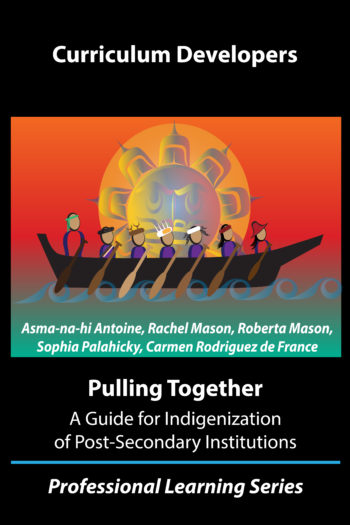Module 3 – Entry 1
Tyler Ohashi
Refining my search to look more closely at Indigenous knowledge systems, specifically how knowledge is created and taught and what type of pedagogies are used, I came across the BC Open Textbook Project. On their website, I found a book called, “Pulling Together: A Guide for Indigenization of Post-Secondary Institutions.”

One chapter, “Indigenous Epistemologies and Pedagogies” stood out to me because it highlights some of the very things I am looking to understand better. This chapter sheds light on key Indigenous epistemologies such as relationality, the interconnection between sacred and secular, and holism. There is also a section on Indigenous pedagogies with information on personal and holistic learning, experiential, place-based learning, intergenerational practices.
I find the information on this website closely related to my revised research question where I will be looking at how to integrate Indigenous ways of learning into Western education in a manner that will benefit all students.
As a final note, I like how this website has some activities with vetted resources to facilitate further investigation. One activity that I see as useful is looking at First Peoples Principles of Learning are used by different Indigenous cultures and how could these principles impact your own curriculum development/lessons.
Reference
Antoine, A.-na-hi, Mason, R., Mason, R., Palahicky, S., & Carmen Rodríguez María del. (2018). Curriculum developers: pulling together: a guide for indigenization of post-secondary institutions. BCcampus, BC Open Textbook Project.
Hi Tyler,
I really like the activities provided in each section. They provide all the necessary resources and guiding questions to facilitate it. The questions also provide opportunities for great discussions and are open-ended.
I checked out a few other chapters of the book and there’s lots of great information on how to integrate Indigenous sources and knowledge. Thanks for sharing! It’s a great resource.
Thank you,
I was quite happy with this find. The fact that it is one BC Open Textbook was great because it is public. It should help me do exactly what I want to do and assist me in incorporating Indigenous aspects into my teaching.
Hi Tyler,
Thanks for sharing this resource. It’s interesting how they mention that spiritual is a necessary component of learning. When I think about the three domains of learning – cognitive, psychomotor, and affective, do you think the spiritual component would fit into the affective domain? Or, would it be a category of its own?
Hello Emma, I always like your questions 🙂
I think that the spiritual component of learning could fit nicely into the affective domain because it deals with emotions and feelings. The spiritual component would have embedded in it lots to do with feeling and emotions.